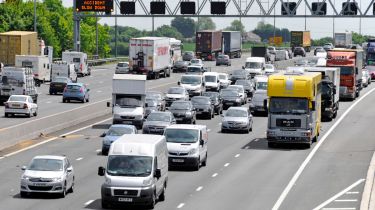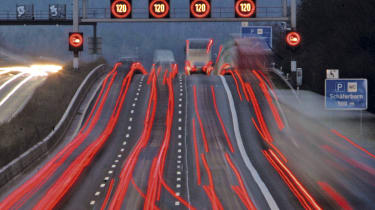Plan to allow driving on motorway hard shoulders slammed
Ministers have spoken out against plans to convert the hard shoulder on smart motorways to a permanent live lane

Ministers have slammed the Government’s plans to turn hard shoulders into a permanent live lane on smart motorways as “unacceptable”. The criticism came in a report by the House of Commons Transport Select Committee that highlighted the increased safety risks to broken down cars and emergency vehicle crews.
The Government plans to use the hard shoulder on smart motorways as a permanent live lane to cut down on congestion and traffic in the future. Previous schemes have only allowed the use of the hard shoulder during peak times or to reduce heavy congestion.
• Concerns that motorists don't understand smart motorways
According to the Department for Transport, traffic levels on all roads are to increase in the future, with the Strategic Road Network to bear the brunt of the rise. In 2015 the DfT forecasted traffic levels to rise by 60 per cent between 2010 and 2040 on the SRN. It predicted that nearly a fifth of the Strategic Road Network could become congested by 2040.
The DfT’s plan is to permanently convert the hard shoulder into a running lane on around 300 miles of motorway. Highways England has around 30 'all lane running' programmes planned for the next nine years, covering over 10 per cent of the motorway network and worth around £6 billion.
The Select Committee disagrees with the plans, as research has highlighted that the distance between emergency refugee areas on smart motorways has increased to roughly 2,500 meters – which was found too far for motorists to reach.

The report found roughly half of all breakdowns studied in certain sections of the M25 did not reach the refugee area, although some were found to have stopped prematurely due to fears of damaging their car. It also found 96 per cent of HGVs were found to stop on the emergency refugee areas for a comfort break and not an emergency.
The MPs say a scheme on the M42 had a good safety track record, but showed concerns over the safety plans for newer schemes and the public's understanding on how and when to use the hard sholder.
An unacceptable reduction in road safety
The report concluded the permanent loss of the hard shoulder during all lane running is a “radical change and an unacceptable price to pay for such improvements.”
Chair of the Transport Select Committee, Louise Ellman MP, said: “The permanent removal of the hard shoulder is a dramatic change. All kinds of drivers, including the emergency services, are genuinely concerned about the risk this presents.
• Toyota recalls 3.37 million vehicles worldwide, 73,000 in UK
“It is undeniable that we need to find ways of dealing with traffic growth on the strategic network. But All Lane Running does not appear to us to be the safe, incremental change the Department wants us to think it is. While 'smart motorways' have existed for years, this is fundamentally different. Government needs to demonstrate that All Lane Running schemes do not make the road any less safe that the traditional motorway with a hard shoulder.”
RAC chief engineer David Bizley said: “Whilst supporting smart motorways as a cost effective and relatively rapid way of increasing motorway capacity, the RAC has repeatedly expressed concerns about the latest design which turns the hard shoulder on motorways into a permanent running lane. These concerns are widely shared by other industry groups, as well as by our members and others who regularly use motorways.”
Do you think we should sacrifice motorway hard shoulders to reduce congestion? Have your say in the comments...
Find a car with the experts


